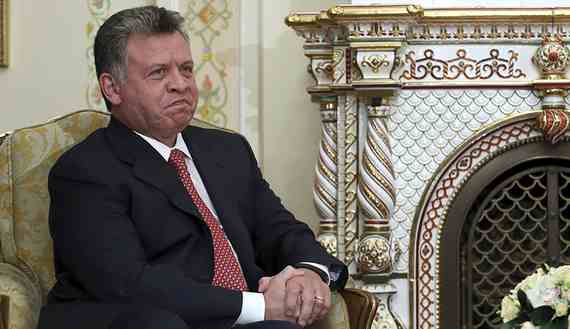Jordan’s king warns against division in Syria
The Jordanian monarch spoke to Al-Hayat in Amman March 22 in the run-up to the Arab League Summit in Kuwait. King Abdullah II warned, “Any division of Syria will create serious problems for the Syrian people and the whole region,” stressing that “all division scenarios will have disastrous results.” He added that division and disintegration “will produce fragile entities that will be a security and human burden on Syria’s neighbors, and could nourish separatist tendencies in the region.”
King Abdullah stressed the need to ensure the unity of Syria and “achieve a political solution and a comprehensive peaceful transition which will save Syria and spare it and the region more violence, strife and destruction.” He noted that the risks associated with terrorism are increasing as the conflict continues, and pointed out that “More than 60 different nationalities are fighting in Syria.”
Al-Hayat asked the Jordanian monarch about his impressions after his last meeting with US President Barack Obama, which lasted more than two and a half hours.
“President Obama clearly stressed the historical and strategic relations between the US and its friends in the Arab world, and [he noted] that he was keen [to maintain] the security and stability of the region,” he said. He pointed out, “The US administration is clear when it comes to linking dialogue with Iran to a time limit and according to results.”
The king stressed, “Strengthening relations and a convergence of views between Saudi Arabia and the US is an important starting point for the stability of the region.” He added, “I hope that President Obama’s upcoming visit [to Saudi Arabia] will provide a window for positive progress in the issues linked to the peace process and the situation in Syria. It is necessary and useful for the US administration to listen to the views of our brothers in Saudi Arabia, as it is the most influential Arab state.”
He stressed the importance of the pivotal role of Egypt in the stability of the region, pointing out that the situation in Egypt requires “a strong, wise and competent leadership that enjoys the confidence of the majority of Egyptians.” He called for applying the [Egyptian] “road map,” and said, “The Egyptian people will decide. And history will show who is working for Egypt and who is working against it.”
He also touched on the situation in Lebanon, speaking of worrying signs and adding, “Our heart is with Lebanon, since it is the most affected by the Syrian crisis in light of its demographic composition.”
He said, “Lebanon’s composition cannot bear any Lebanese party interfering in the Syrian crisis, for all of Lebanon is being pressured by the consequences of this crisis.”
After stressing that the two-state solution is the only answer to the Palestinian-Israeli conflict, he said that Jordan would accept what is agreed upon by the Palestinians and Israelis under US auspices, provided “it does not infringe upon Jordan’s sovereignty and ensures full Palestinian sovereignty.”
Regarding the presence of a squadron of US planes in Jordan and a Patriot missile battery, he said, “We have a responsibility to protect the Jordanians … Caution now is better than regret later, God forbid.” He added, “How can we be reassured when the region around us is inflamed?”
Regarding the possibility of the crisis in Ukraine having repercussions on the Syrian situation, the Jordanian monarch warned, “Any negligence of the Syrian crisis or delay in addressing it will increase its complexity, and it will become more difficult and dangerous. The entire international community will pay the price.”


